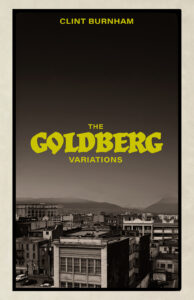Metamodernism ∴ aporetic verse
The Goldberg Variations
by Clint Burnham
Vancouver: New Star Books, 2024
$16.00 / 9781554202096
Reviewed by Joe Enns
*

The first reading of The Goldberg Variations by Vancouver’s Clint Burnham (Pound @ Guantánamo) is like trying to drink from a firehose. Burnham’s seventh book of poetry isn’t just fast-paced, the collection has one pace: unrelenting and breathless; a barrage of thoughts that span a jarring variety of topics—“women working / men twerking I’m shirking / you’re Tolstoy told a story / on the suzerainty a coke’s // really local.”
Burnham’s whiplash array of cultural references establishes an economy of attention. The Goldberg Variations tests how much information a reader can retain, like scrolling (or doom-scrolling) social media feeds and comments with an eroding level of focus. The title and central theme relate to J.S. Bach’s Goldberg Variations: variations of an aria which follow the chord progression, but not the melody. Burnham pulls language from sources all around, spiraling clips of unfinished thoughts, each poem its own melody, yet following an underlying perpetual rhythm.
Burnham writes with an educated and well-informed awareness of the social world around him, and this speeding train of thought covers topical cultural moments underlaid with historical references often specific to Vancouver and British Columbia (“Fassbinder’s Querelle screened at / the RBC cinema in the mid-80s / organizing farm workers in the / Fraser Valley”). Each dense poem, and each line, demands a close reading to derive any meaning.
The topic of counterculture or societal resistance surfaces throughout the collection—“the White House in 1985, / ostranenie doesn’t fit if we / have enough shovels, bad / British Columbians, No Fun / was a better band than Low / Fun, benefit for the Squamish / Five couldn’t happen now”—and appropriately many aspects of the poetic form resist or defy convention. The poem titles run sideways vertically beside the poems, lines break on weak words, and thoughts are left unresolved. Acronyms, partial words, and twists of slang sacrifice clarity: “when a poem suggests / lookin’ at the Wikipedia // edits for the finest death / monologue in cinematic // history.” I googled words and terms constantly while reading, learning something new each time.
Most of the poems are oriented not centre-justified, but left-justified and tabbed such that the lines run the middle of the page, leaving a wide left margin. The stanzas create blocked shapes, and in a few poems, split in two across the page, resembling panels in a social media feed or web page. Throughout these scrolling lines of text, Burnham incorporates interesting wordplay through sound and word association, or phrase association that almost seems like a game with obscure rules. Consider, for instance, an excerpt from “B.A.”:
Astro Terf cheerleaders solid
Tees I love the smell of Nembutal
in the My Bloody Valentine cover band dressing
room hedge fund vampires posteriors
in Post-it note Pugwash grime
core app nightclub line-up bifurcation
Amazon boxes and Keurig capsules are the
new horse shit and piles of junked cars awaiting
their Walker Evans moment \
do the mask discard for the Gram

Burnham recombines apparently random phrases that—perhaps—build the notion that modern society doesn’t need nuclear war to create an apocalypse; we can self-impose our own pseudo-apocalypse through attention-seeking superficiality and greed. Astro Turf (not sure why it’s spelled “terf”) is the perfect symbol of the human desire to create false nature and this is amplified by the cheerleaders, attention-seekers with a practised and staged cheer. The word “Tees” could be a homophone for “tease.” Burnham adds to this a cover band, a rock group pretending to be another rock group, requiring sedatives. When I googled “hedge fund vampires,” I found a 2020 Vanity Fair article about how Alden Global Capital put major newspapers out of business to squeeze out any last profits. Unchecked greed (hedge funds could also be a concept of hypothetical money): a reality that undermines journalism and democracy.
Burnham also references Pugwash, which holds the annual Pugwash Conferences on Science and World Affairs. These conferences cover world-threatening topics like nuclear weapons. But then Burnham shifts to Walker Evans, a notable early twentieth century photographer who captured a close spectator view of ordinary subjects. The photograph is a rendering of a perspective, which can be art, but can also be bastardized for greed and attention in modern society through social media (“the Gram”). Like Walker Evans photographing the trappings of human society, depicting the present as though it’s already the past, Burnham captures this current moment in his own form. The poet weaves together threads of images, history, art, social media, and politics in a flurry of phrases.
In The Goldberg Variations, Burnham’s poems are not emotionally engaging (“tougher than / pleather”). Puzzle-like, they appeal strictly to the reader’s intellect while they jab at political sensibilities, sometimes in cringy, eyebrow-raising ways (“first do // blackface then do trigger / warning first get pussy / with Fanon and Marx then / neoliberal blowhardon”). Burnham requires the reader to do a lot of work, which makes much of the poetry inaccessible. But if the reader can deep dive through the log jam of information, they may find a broader perspective on this moment in history.
*

Joe Enns is a writer, painter, and fisheries biologist on Vancouver Island. His writing has appeared in The Dalhousie Review, FreeFall, The Fiddlehead, GUSTS, and Portal Magazine, and book reviews in The Malahat Review and The British Columbia Review. Joe has a BA in Creative Writing and a BSc in Ecological Restoration. [Editor’s note: Joe has reviewed Nadine Sander-Green, Spenser Smith, Rodney DeCroo, Barbara Pelman, Karl Meade, M.W. Jaeggle, Ali Blythe, Emily Osborne, Will Goede, and Evelyn Lau for BCR.]
*
The British Columbia Review
Interim Editors, 2023-25: Trevor Marc Hughes (nonfiction), Brett Josef Grubisic (fiction)
Publisher: Richard Mackie
Formerly The Ormsby Review, The British Columbia Review is an online book review and journal service for BC writers and readers. The Advisory Board now consists of Jean Barman, Wade Davis, Robin Fisher, Barry Gough, Hugh Johnston, Kathy Mezei, Patricia Roy, Maria Tippett, and Graeme Wynn. Provincial Government Patron (since September 2018): Creative BC. Honorary Patron: Yosef Wosk. Scholarly Patron: SFU Graduate Liberal Studies. The British Columbia Review was founded in 2016 by Richard Mackie and Alan Twigg.
“Only connect.” – E.M. Forster